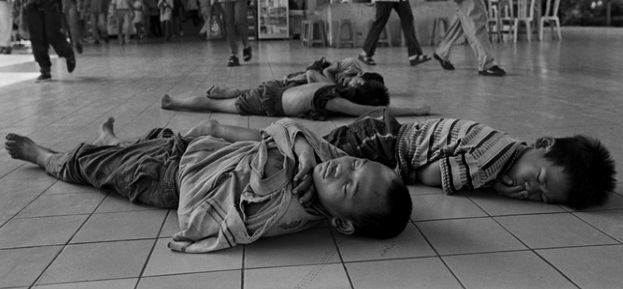MICHELLE VARINATA WRITES – Picture a world of rainbows , puppy dogs and smiling children running through rose-scented gardens. Sure, it’s a dream. But for some, even imagining such a scene could prove impossible, so harsh is their reality.
As one of the world’s most family-oriented societies, Indonesia prioritizes family as a cultural institution. While most children enjoy care and love from their parents, a national statistic reveals that there are 3 million homeless people living in the streets of Indonesia – many of them children.
Aside from homelessness, there are also children who have mental disabilities, ranging from Down Syndrome to autism. Like homeless children, mentally disabled kids are often left behind by family members and misunderstood by “traditional healers” as being occupied by evil spirits. To make matters worse, there are only 500 psychiatrists for a population of 240 million.
While homelessness and mental disabilities are like apples and oranges, they’re both national taboos. While many Western organizations such as UNICEF like to present Asian children alongside “Western” ones, they are completely misrepresenting the fact that Indonesia has local resources that aim to raise awareness about homelessness and treatment for the mentally disabled.
Recently,The Jakarta Post reported that Bina Grahita, a Jakarta-based children’s shelter, has been taking care of homeless and mentally disabled children. Since 1997, Bina Grahita aims to nurture homeless and mentally disabled children by providing them with a safe haven where they can eat and learn to perform chores (such as cleaning the dishes and/or motorcycles). At Bina Grahita, a single caretaker supervises 6-7 children and assists them with their routines, which range from feeding to accompanying a child to the bathroom. While these aforementioned routines are necessary, it will help each child prepare their way to adulthood so that they can become fully independent without the assistance of an adult.
As the head of Bina Grahita, Ngapuli Peranginangin hopes that the children will be employable in the hospitality and service industries. Disability rights activist Aria Indrawati adds that Bina Grahita could help the children find jobs in small businesses as opposed to expecting the doors to open for every job prospect. While the shelter is still experimenting with helping children obtain future careers, Bina Grahita and other organizations must educate social workers on different types of mental disabilities so that each child can receive the right treatment.
While I had a completely different upbringing than the children at Bina Grahita, I was lucky to have been able to receive therapy, land an internship, and become an educated, assertive, and fully independent young woman. However, I came a long way to get to where I am today. When I was a toddler, I was diagnosed with ADD and Asperger’s Syndrome, a mild form of Autism. Unfortunately, my parents were not able to find a psychiatrist or child behavioral center in Indonesia due to lack of resources. My diagnosis also got in the way of my social life in elementary school, since I had to see a behavioral therapist while at school. Like the children at Bina Grahita, I overcame each adversity step by step. While it was no overnight success, overcoming the developmental difficulties that came with mental disorders has brought me hope that we can find a solution to every problem.
If the media can start a conversation about homelessness and mental disabilities, more people in Indonesia will prioritize these issues. From there, we can build up a strong, healthy nation.

